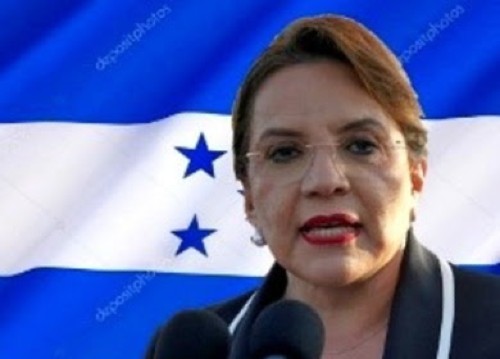TEGUCIGALPA, Honduras – Honduran President, Xiomara Castro, says she will convene a summit of the Community of Latin American and Caribbean States (CELAC) to seek an urgent and solidarity-based solution to the crisis in Haiti, where criminal gangs have been seeking to overthrow the government.
 President Xiomara Castro“I will convene the CELAC Heads of State so that we can define together a position of absolute and urgent solidarity with Haiti,” said President Castro, who has held the pro tempore presidency of the regional organization since March 1, this tear.
President Xiomara Castro“I will convene the CELAC Heads of State so that we can define together a position of absolute and urgent solidarity with Haiti,” said President Castro, who has held the pro tempore presidency of the regional organization since March 1, this tear.
Xiomara Castro said she is seeking solutions to regional problems “without interference or external pressure, with dialogue as a tool and always thinking about regional well-being and the self-determination of peoples.
“It is urgent to raise our voices for the Haitian people, who are today plunged into a spiral of violence,” she added.
No details have been released on the location and date of the proposed summit. CELAC was founded on February 23, 2010, at the Latin American and Caribbean Unity Summit in Mexico, and officially constituted by the Heads of State and Government of its 33 member countries at a meeting in Caracas, Venezuela, on December 3, 2011.
The member countries include Antigua and Barbuda, Argentina, Bahamas, Barbados, Belize, Bolivia, Brazil, Chile, Colombia, Costa Rica, Cuba, Dominica, Dominican Republic, Ecuador, Grenada, Guatemala, Guyana, Haiti, Honduras, Jamaica, Mexico, Nicaragua, Panama, Paraguay, Peru, St. Kitts, St. Vincent and the Grenadines, St. Lucia, El Salvador, Suriname, Trinidad and Tobago, Uruguay and Venezuela.
Haiti has been thrown into political and socio-economic problems that have been by the July 2021 assassination of then President Jovenel Moise.
Since then attempts to deal with the criminal gangs that occupy a significant portion of the capital has resulted in numerous killings and kidnappings and many people have fled their homes,
The United Nations said that gangs continue spreading terror and fear in Haiti and that the country was mired in a “complex and multifaceted crisis” encompassing security, economic, social, human rights, development and humanitarian challenges.
Haiti’s Ambassador to the United Nations, Antonio Rodrigue, said there has been a targeted and sustained joint security operation against gangs by security officers with the international support mission (MSS) and Haitian National Police, particularly in the centre of Port-au-Prince, but tangible results have been “slow”.
Last month the newly appointed Prime Minister Alix Didier Fils-Aimé, said the country is experiencing a “critical” situation, and “there is no time to lose”.
“Our mission is clear: we must restore hope to our people by facing with determination the great challenges facing Haiti,” he said, adding that “insecurity in all its forms must be vigorously combated, in particular physical, economic and food insecurity.”
Last Saturday, as part as part of the changes taking place at the level of the command of the National Police of Haiti (PNH), Acting Commander of the PNH, his Chief of Staff, Inspector General Smith Péyo, proceeded to install Inspector General Alain Auguste as the new Central Director of the Administrative Police (DCPA)
Auguste has more than 20 years of experience within the police institution. He has been, among other things, Police Commissioner of Port-au-Prince, Departmental Director of the West of the PNH, head of the Unit of Security of the Prime Minister’s Office and Logistics Director of the PNH.


